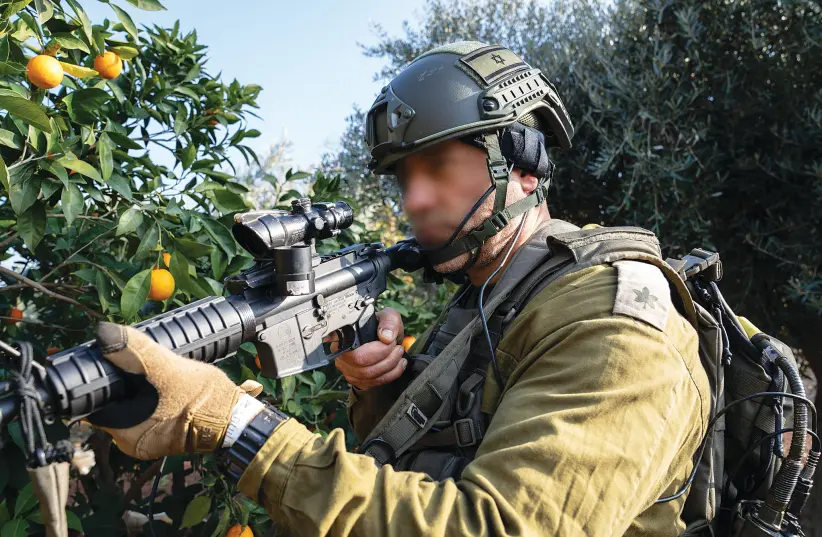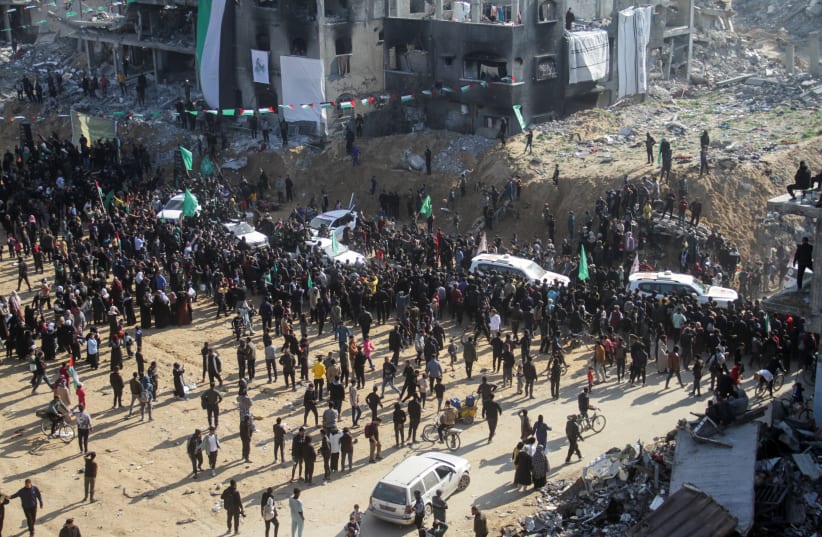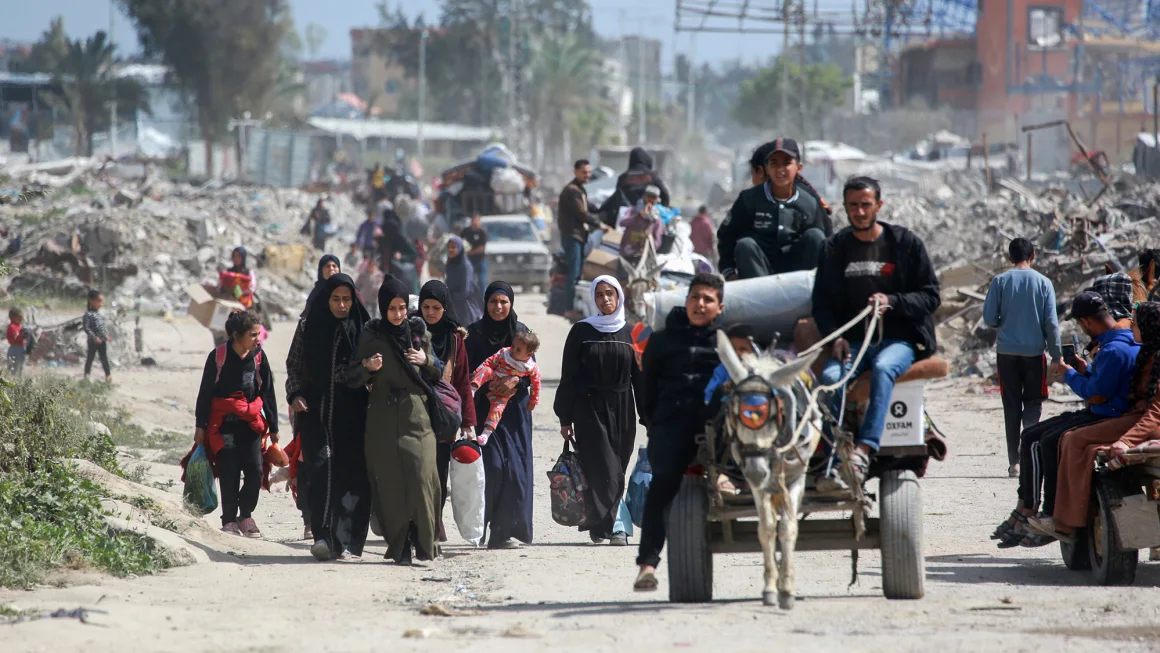Foreign
Hezbollah in Lebanon: Israel’s greatest threat on its quietest border

MILITARY AFFAIRS: Though Iran still grabs more headlines, most defense establishment officials still emphasize that Hezbollah is Israel’s greatest threat.

It is a slow and constantly unfolding chess match.

Luckily, however, it is only an IDF drill to bolster Israel’s capabilities to secure the Lebanese border, conducted by the IDF’s Unit 769 and special Devorah Unit.
As recently witnessed by The Jerusalem Post near Metulla, the drill provided clear reminders throughout that the Hezbollah danger is real and as close as can be.
Soldiers were positioned strategically throughout Metulla and spread along the border fence that cuts through the town. They were playing out a scenario where Hezbollah has already fired at and struck parts of the North, including key roads and sensitive facilities, and attempted to invade border villages.
Though Iran still grabs more headlines, most defense establishment officials still emphasize – behind closed doors and sometimes publicly – that Hezbollah, with its approximately 150,000 rockets and Radwan special invasion forces, is Israel’s greatest threat.
The Devorah Unit is made up of IDF reservists who are veterans of elite units and who live in the North, which helps personalize the conflict, as they bring an intense and personal commitment to protect the border from danger.
The unit’s commander, Maj. O., was born in the North, in Beit Hillel, and lives in She’ar Yashuv, which is located in the Upper Galilee in the northeastern Hula Valley, about 15 kilometers from Metulla – meaning from the border, which, despite the grave threat, has been Israel’s quietest border since the 2006 Second Lebanon War.
Although most Israelis at the time viewed that war as a failure, nearly all IDF officials today say that it was the most successful of Israel’s wars over the last 16 years, because it has kept Hezbollah deterred.
Married, with three kids, O. works in his family’s business in agriculture and tourism.
“I am here always. I don’t know anything at all other than the North. I have experienced all the different eras,” he said.
“All of my family is in security,” he continued. “When I was a child, my father was a security commander in our village, which was capable of defending itself [and had] all of the necessary equipment, to the point that we joked it was as if” the village was a secured fortress.
He said that, over the years, he has experienced many incidents of being under Katyusha rocket fire.
“I, personally, was never harmed, but there were always Katyushas around. One landed directly across the street from my house, another near my car. I grew up in the shadow of Katyusha rockets.
“Once, a Katyusha rocket killed some cows of my neighbor and also led a shocked driver nearby to run over my dog,” he recounted.
In those days, O. would often run to a community bomb shelter. Now, he said, all of the residents have their own safe rooms connected to their residences. Half joking, he said, “I miss seeing my friends who I used to see in the community bomb shelter” when Katyushas were fired.
He said he did his obligatory IDF service in the Northern Command’s Golani Brigade, noting it was fun because this meant he could drop in to get coffee from home and sleep at his house on a daily basis, instead of having to sleep on the base like out-of-towners.
Also, he said that his brother had served in a parallel Golani unit – O. was in Unit 13, and his brother Unit 12 – which allowed the two of them to sometimes make plans in a seamless way, crossing the bureaucratic lines.
Further, he said that in the past he could meet up with his father at the Egel crossing near Kfar Yuval, since his father was serving in the reserves in Lebanon.
O. did some IDF reserve duty and spent some time as a security officer in various overseas locations. But he eventually returned to the Israeli North and asked “How can I fully get back into” defending Israel’s border? The challenge was that his own village was near, but not on, the border.
Then he attended a conference where speakers discussed forming a special unit of IDF reserve duty soldiers who live in the area, “a group of true combat troops.”
He said that he helped bring a number of friends and local people he knew into the new unit, starting off as the unit’s deputy commander and eventually emerging as its commander. He said that 90% of the unit is composed of local fighters. This means that the unit’s soldiers can move from their homes to being assembled at the border in only 15-30 minutes.
This is breakneck speed and faster than even the most rapid, more formal system could possibly move.
Moreover, he said that they train in a formal setting multiple times a year, in addition to regular informal training, as opposed to many reservists who often do only one major training stint per year.
Committing to the regular informal training in order to be in better physical condition than regular infantry units appeared to be both part of the fun and camaraderie and a precondition for joining the special unit. But many locals are attracted to the unit because of the close ties between the soldiers and the ability to participate in reserve duty while still living at home.
O. emphasized that the unit is selective in a number of other ways, including ensuring that any new recruits fit in well with the group and have clear reasons for remaining in the North on a long-term basis.
Part of being in a special unit means having high-quality, new equipment.
O. described a complex life of always being in the face of massive danger from Hezbollah, while in practice also being on the quietest border of conflict since after the 2006 Second Lebanon War.
REGARDING MOUNT DOV, he said there have been “unwritten rules” in which Hezbollah would be allowed to make more mischief in occasionally taking shots at Israeli forces, but he said this must be opposed and stopped.
Discussing current Hezbollah threats in more detail, he said, “We know they are here, the Radwan commandos, and if there are rockets, there is no time to evacuate to a bomb shelter,” because Metulla is so close to the border.
“Hezbollah is on the fence, so we get ready for everything. It is very real. Any unpredictable hit in the ‘war between the wars’ campaign [with Syria] could lead to a giant Lebanon conflict. One Katyusha rocket hits a kid’s kindergarten in Metulla or one anti-tank missile hits someone in Misgav Am.”
Maj. O. O. also said, “Hezbollah is on the fence, so we get ready for everything. It is very real. Any unpredictable hit in the ‘war between the wars’ campaign [with Syria] could lead to a giant Lebanon conflict. One Katyusha rocket hits a kid’s kindergarten in Metulla or one anti-tank missile hits someone in Misgav Am,” and the whole region could be on fire.
“Hezbollah soldiers gained experience in Syria. They are more independent operators, have heavier firepower, use lookouts, battle formations. If Radwan got to Metulla…,” he said, trailing off as if finishing the thought was too dark of an option.
Moreover, he warned, “We are very close. We know that they can make a comeback. Metulla has dilemmas. It does not take a [brilliant military leader like] Napoleon to see that Hezbollah can invade from three to four directions, as well as [Metulla] being hit by rockets.”
On the other hand, “Hezbollah has stopped using their tunnels. We took away their ‘atomic bomb,’” he said with pride.
Regarding Nasrallah, O. said it is important for him to feel as though he is setting the agenda and the narrative to be, “‘I saved Lebanon, and I got the IDF to evacuate. I will conquer the Galilee.’ He has big rhetorical flourishes” about the Galilee and “saving Lebanon’s access to its gas.”
In analyzing the natural gas deal, he said that the IDF doesn’t seem to think there will be war tomorrow, because Nasrallah does not want a direct full conflict. At the same time, he cautioned that there is no formal obstacle to such a conflict breaking out, so many smaller incidents could accidentally lead to broader fighting.
But he said that Hezbollah started building new positions a few months ago, which they are using as lookouts. “There is a feeling that they are coming back,” in terms of actively patrolling the border and studying IDF border activities.
The lesson appeared to be that the quiet could be deceiving and temporary, and having O., his forces and others constantly training and at the ready is the only true way to remain safe. •

Foreign
Hamas claims spokesperson killed in Israeli strike on northern Gaza

Earlier this week, Israel killed Ismail Barhoum, a member of Hamas’ political office, and Salah al-Bardaweel, another senior leader.

Hamas spokesman Abdel Latif al-Qanou was allegedly killed in an Israeli airstrike on northern Gaza, Hamas-affiliated news agency Shehab reported on Wednesday night.

Al-Qanoa was one of Hamas’s most prominent spokesmen in Gaza, and while he avoided media appearances during the months of fighting, he gave multiple interviews to Arab news channels after the ceasefire.
Al-Qanoua was killed when his tent was targeted in Jabaliya, the Hamas-run Al-Aqsa television reported. The same strike wounded several people, medical sources said.
Earlier this week, Israel killed Ismail Barhoum, a member of Hamas’ political office, and Salah al-Bardaweel, another senior leader.
Both Bardaweel and Barhoum were members of the 20-member Hamas decision-making body, the political office, 11 of whom have been killed since the start of the war in late 2023, according to Hamas sources.
Tents for Palestinians seeking refuge are set up on the grounds of a United Nations Relief and Works Agency for Palestine Refugees (UNRWA) centre in Khan Yunis in the southern Gaza Strip on October 19, 2023, amid the ongoing battles between Israel and the Palestinian group Hamas (credit: MAHMUD HAMS/AFP via Getty Images)
The IDF has yet to comment on the alleged elimination.
Increased IDF pressure in the Gaza Strip
Since fighting in Gaza was renewed at the beginning of last week, the IDF has killed 150 terrorists, including 10 top Hamas officials, The Jerusalem Post learned Tuesday.
In certain areas, the military has entered a full kilometer into Gaza, such as around the Nitzanim Corridor in central Gaza.
In addition to central Gaza, Beit Lahia, Beit Hanoun, parts of Khan Yunis, Shaboura, and Tel Sultan, the IDF has been evacuating and moving into Jabaliya.

Foreign
Dead Nigerians, Africans, others without will may lose unclaimed estates in UK

Hundreds of unclaimed estates reveal untold stories of African migration, wealth, and family ties left behind.
Thousands of people die every year in the United Kingdom without leaving a will or identifying next of kin, and among them are many Nigerians and other Africans whose estates—ranging from property to savings—remain unclaimed.
The UK government’s latest list of unclaimed estates, updated daily, includes over 170 entries connected to African-born individuals, with Nigerians making up a significant portion of the cases.

A Legacy Lost
For many migrants, the UK became a home away from home—a land of opportunity where they built wealth, purchased property, and created a life.

However, the absence of a will often results in their assets being classified as “bona vacantia” (ownerless goods), leaving them to the custody of the Crown.
Families back in Africa are frequently unaware of these estates, leading to a permanent loss of assets.
Cases like that of Adenike Adebiyi, who passed away in Hackney, London, in 2004, or Solomon Adekanmibi, who died in Colchester, Essex, in 2021, highlight the consequences of dying intestate.
With no identified next of kin or missing documentation, their estates remain unclaimed, and their legacies risk being forgotten.
Why It Matters
This phenomenon underscores a critical issue: many African families are unaware of their relatives’ financial situations abroad.
Migration often disrupts communication, and without clear documentation, the wealth built overseas remains beyond reach.
The loss isn’t just financial—it’s deeply cultural and emotional. Unclaimed estates represent untold family histories, connections, and the struggles of migrants who built their lives in the diaspora.
The Challenges
Lack of Awareness:
Most families in Nigeria and other African countries are unaware of their relatives’ estates abroad or how to access them.
Genealogical Gaps:
The information provided in official records is often incomplete. For example, many entries in the UK unclaimed estates list lack detailed family history or next-of-kin information.
Cultural Hesitations:
In many African cultures, discussing death and wills is considered taboo, leading to reluctance in planning for asset distribution.
A Call to Action
African governments, community organizations, and legal professionals need to raise awareness about this issue.
Here’s what can be done:
Encouraging Will Writing: Migrants in the diaspora should be educated about the importance of drafting wills to protect their assets.
Genealogical Support: Families in Africa can be assisted in tracing unclaimed estates through local or international partnerships.
Public Awareness Campaigns: Social and traditional media can highlight the importance of estate planning and share resources for families.
How to Check the List
The UK government maintains a public Unclaimed Estates List that is updated daily.
Families can search the list by name, place of birth, or other identifiers to check for potential claims.
Final Thoughts
For many Nigerians and Africans in the UK, their unclaimed estates represent more than just wealth—it’s a story of migration, resilience, and identity.
By addressing this growing issue, families can reclaim their heritage, and the legacy of those who journeyed to the diaspora need not be forgotten.
Here is the latest daily update as of March 24, 2025. Check the list

Foreign
Israel approves controversial proposal to facilitate emigration of Palestinians from Gaza

Israel’s security cabinet has approved a controversial proposal to facilitate Palestinian emigration from Gaza, a move critics warn could amount to ethnic cleansing.

Israeli Finance Minister Bezalel Smotrich on Sunday said the security cabinet approved the proposal by Defense Minister Israel Katz to organize “a voluntary transfer for Gaza residents who express interest in moving to third countries, in accordance with Israeli and international law, and following the vision of US President Donald Trump.”

The decision marks a remarkable endorsement of a plan once considered a far-right fantasy – and comes despite the prime minister’s earlier pledge not to permanently displace Gaza’s civilian population.
Critics have said that any mass displacement of Gazans in the midst of a devastating war would amount to ethnic cleansing, an act associated with war crimes and crimes against humanity under international law. Israeli officials have countered that emigration would be voluntary and in line with international legal standards.
But aid groups argue that Israel’s war has made life in Gaza nearly impossible. Martin Griffiths, the United Nations’ top emergency relief official, has called the enclave “uninhabitable,” saying its people are “witnessing daily threats to their very existence.”
The Israeli approval would establish an administration within the defense ministry “to prepare and facilitate the safe and controlled movement of Gaza residents who wish to voluntarily move to third countries,” according to a statement from the defense ministry.
Its work would include “establishing movement routes, pedestrian checks at designated crossings in the Gaza Strip,” and infrastructure to enable people to leave.
Israeli officials have presented the plan as a fulfillment of a desire by Trump to take over Gaza, expel its Palestinian population to neighboring countries and turn it into a Middle Eastern “riviera.”
The Palestinian Authority’s Minister of State for Foreign Affairs Varsen Aghabekian Shaheen told CNN’s Becky Anderson last month that Palestinians “are steadfast to stay in their land and will not move.”
Trump’s ‘vision’
Katz said Sunday that Israel is using “all means to implement the vision of the US president,” according to the defense ministry statement.
This month, Trump appeared to backtrack on his comments about displacing Palestinians, telling reporters that “nobody is expelling any Palestinians.” Steve Witkoff, the US special envoy to the Middle East, said last month that the US initiative to rebuild Gaza won’t necessarily amount to an “eviction plan” and that it was designed to “shake up everybody’s thinking.”
Last year, Israeli Prime Minister Benjamin Netanyahu said his country had no intention to displace Palestinians or occupy Gaza.
Related articleTrump says ‘nobody is expelling Palestinians,’ weeks after saying they should be moved to Arab states
“I want to make a few points absolutely clear: Israel has no intention of permanently occupying Gaza or displacing its civilian population,” Netanyahu said in a video statement in January 2024.
Trump’s proposal has, however, brought the idea further into the mainstream, with Israeli politicians now openly discussing mass emigration of Gazans as a solution to the war. And Katz last week said that Israel may maintain a permanent presence in the enclave.
Israeli rights group Peace Now criticized the plan, saying “the establishment of the administration to expel Palestinians from Gaza is one of the stupidest moves by a government that has lost all direction and logical thinking.”
The prospect has also drawn sharp rebuke from Arab leaders, especially Egypt and Jordan, who would be expected to absorb the large number of expelled Palestinians. Experts have also warned that displacing Palestinians would further destabilize the region and threaten the security of neighboring states.
Smotrich said Sunday that the security cabinet also approved the expansion of Jewish settlements in the occupied West Bank, noting that 13 areas in the West Bank would be split from existing settlements and would be recognized as independent settlements.
“Instead of hiding and apologizing – we are raising the flag, building, and settling. This is another important step on the path to actual sovereignty in Judea and Samaria,” he said, using the name by which Israelis refer to the West Bank.
The Yesha Council, an umbrella body representing Jewish settlements, said that as of January 2024, there were 150 settlements in the West Bank.
It said that the decision exposes a “long-standing lie that (Israel) does not establish new settlements, but only ‘neighborhoods’ of existing settlements” and that it is “another nail in the coffin that the Government of Israel is preparing for the only chance for a future of peace and security.”
A statement sent by Smotrich’s office said the move comes against “the backdrop of the approval of tens of thousands of housing units in Judea and Samaria and represents another significant step in the process of normalizing and regulating the settlement.”
Smotrich and other right-wing ministers have been pushing an aggressive expansion of settlements on the path to declaring Israeli sovereignty over the West Bank, which would be in defiance of international law and UN Security Council resolutions.
Israel says it will maintain ‘permanent’ presence in Gaza unless hostages are freed

-

 Politics1 week ago
Politics1 week agoOpposition leaders announce coalition to challenge Tinubu in 2027
-

 Foreign1 week ago
Foreign1 week agoHouthis declare Ben-Gurion Airport ‘no longer safe’ after renewed Gaza fighting
-

 Politics1 week ago
Politics1 week agoYahaya Bello deceptively arranging recall of Senator Natasha, desperate to replace her – Constituents
-

 News1 week ago
News1 week agoWhy Christ Embassy’s Pastor Chris holds Abuja mega crusade – Fisho
-

 Crime1 week ago
Crime1 week agoGhana’s anti-drug agency nabs Nigerian drug kingpin, Uchechukwu Chima, seizes $2.1m worth of cocaine, heroin
-

 News1 week ago
News1 week agoUmeh denies receiving $10,000 with other 42 Senators to support state of emergency in Rivers
-

 Politics1 week ago
Politics1 week agoAtiku, El-rufai, Obi condemn Tinubu’s suspension of Rivers Governor, demand reversal
-

 Business1 week ago
Business1 week agoFlutterwave, FIRS collaborate to digitize tax collection in Nigeria




















